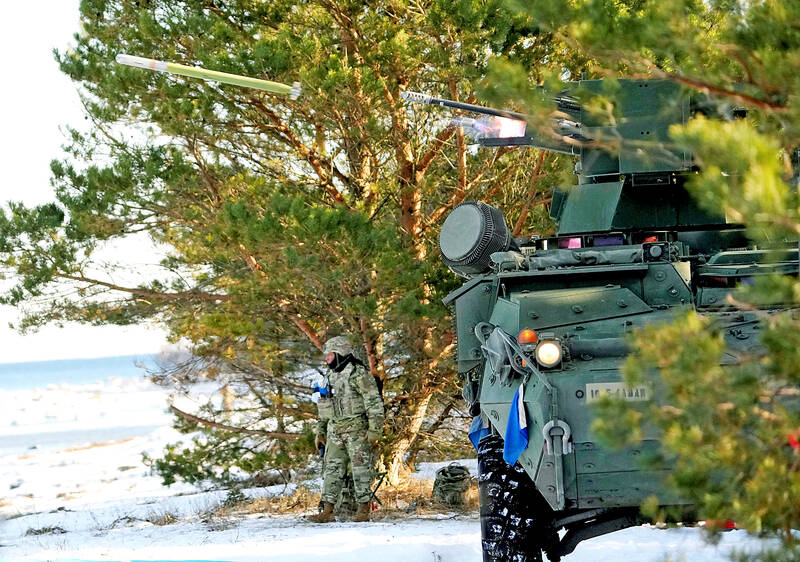A batch of FIM-92 Stinger missiles arrived overnight on Thursday, the Chinese-language United Daily News reported yesterday, citing an unnamed source.
The arms shipment delivered in a Boeing 747 cargo plane at Taiwan Taoyuan International Airport has been received by the Ministry of the National Defense, the newspaper reported.
It is part of a US$500 million aid package to Taiwan utilizing the US’ presidential drawdown authority, which draws from US stocks of weaponry and has been used to expedite weapons deliveries to Ukraine, the report said.

Photo: REUTERS
The air defense weapons are handheld portable variants of the Stinger missile system.
The package is believed to include weapons systems earmarked for Taiwan, but whose delivery had been delayed due to the Russia-Ukraine war and supply chain issues related to the COVID-19 pandemic.
The armed forces already operate variants of the missile, including the Dual Mount Stinger (DMS), the Humvee-mounted Avenger weapons system and an air-launched version adapted for Apache attack helicopters.
Stingers are light, mobile, fire-and-forget air defense weapons that enable the operator to seek cover, relocate or engage a new target immediately after firing, which increases efficiency. They can also be used as short-range weapons against aircraft flying at low altitudes.
The US authorized the transfer of Stinger missile systems in 1996. No further transfers were made after 2000 out of concern that the weapons possess an offensive potential.
On Tuesday last week, US Secretary of Defense Lloyd Austin told the US Congress that a substantial military aid package would be delivered to Taiwan.
Minister of National Defense Chiu Kuo-cheng (邱國正) confirmed that the US had informed Taipei of the package ahead of its public announcement.
Commenting on condition of anonymity, a US defense official said that US President Joe Biden used special emergency presidential powers to authorize the package and ensure that backlogged arms would be delivered to bolster Taiwan’s defenses.
No further comments about the implementation details and items in the package could be made, they said.
Yesterday, Institute for National Defense and Security Research analyst Shu Hsiao-huang (舒孝煌) said that the backbone of the nation’s air defenses is comprised of US-made Patriot and domestically developed Tien Kung missiles, but the nation lacks weapons that are effective against low-flying aircraft.
Portable handheld Stinger air defense missiles would be effective against helicopters and drones launched from Chinese People’s Liberation Army amphibious assault ships, he said.
Recent simulations conducted by US think tanks have underscored the importance of having adequate stockpiles of ammunition in deterrence and warfare, he said.
Modern warfare is highly intensive in the use of ammunition and equipment, and Taiwan would not be able to resupply if it is subjected to a naval blockade, Shu said.
The reported inclusion of Stinger missiles and anti-armor weapons such as TOWs and Javelins in upcoming packages suggests that the US is prioritizing territorial defense over long-range strikes or decisive battles at the beachhead, retired air force lieutenant general Chang Yan-ting (張延廷) said.
Ukraine defends its air space from Russia by utilizing air defense missiles, including Stingers, which precludes the invaders from deploying mass airstrikes, he said.
Additional reporting by Wu Su-wei

The Central Election Commission has amended election and recall regulations to require elected office candidates to provide proof that they have no Chinese citizenship, a Cabinet report said. The commission on Oct. 29 last year revised the Measures for the Permission of Family-based Residence, Long-term Residence and Settlement of People from the Mainland Area in the Taiwan Area (大陸地區人民在台灣地區依親居留長期居留或定居許可辦法), the Executive Yuan said in a report it submitted to the legislature for review. The revision requires Chinese citizens applying for permanent residency to submit notarial documents showing that they have lost their Chinese household record and have renounced — or have never

A magnitude 5.6 earthquake struck off the coast of Yilan County at 12:37pm today, with clear shaking felt across much of northern Taiwan. There were no immediate reports of damage. The epicenter of the quake was 16.9km east-southeast of Yilan County Hall offshore at a depth of 66.8km, Central Weather Administration (CWA) data showed. The maximum intensity registered at a 4 in Yilan County’s Nanao Township (南澳) on Taiwan’s seven-tier scale. Other parts of Yilan, as well as certain areas of Hualien County, Taipei, New Taipei City, Taoyuan, Hsinchu County, Taichung and Miaoli County, recorded intensities of 3. Residents of Yilan County and Taipei received

Taiwan has secured another breakthrough in fruit exports, with jujubes, dragon fruit and lychees approved for shipment to the EU, the Ministry of Agriculture said yesterday. The Animal and Plant Health Inspection Agency on Thursday received formal notification of the approval from the EU, the ministry said, adding that the decision was expected to expand Taiwanese fruit producers’ access to high-end European markets. Taiwan exported 126 tonnes of lychees last year, valued at US$1.48 million, with Japan accounting for 102 tonnes. Other export destinations included New Zealand, Hong Kong, the US and Australia, ministry data showed. Jujube exports totaled 103 tonnes, valued at

BIG SPENDERS: Foreign investors bought the most Taiwan equities since 2005, signaling confidence that an AI boom would continue to benefit chipmakers Taiwan Semiconductor Manufacturing Co’s (TSMC, 台積電) market capitalization swelled to US$2 trillion for the first time following a 4.25 percent rally in its American depositary receipts (ADR) overnight, putting the world’s biggest contract chipmaker sixth on the list of the world’s biggest companies by market capitalization, just behind Amazon.com Inc. The site CompaniesMarketcap.com ranked TSMC ahead of Saudi Aramco and Meta Platforms Inc. The Taiwanese company’s ADRs on Tuesday surged to US$385.75 on the New York Stock Exchange, as strong demand for artificial intelligence (AI) applications led to chip supply constraints and boost revenue growth to record-breaking levels. Each TSMC ADR represents